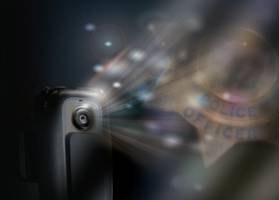 In the wake of the death of Michael Brown in Ferguson, Mo., there’s been a clarion call for a mandate that police officers nationwide wear body cameras. Over 150,000 individuals signed a petition on Whitehouse.gov demanding such a proposed law — named a Mike Brown Law — be enacted.
In the wake of the death of Michael Brown in Ferguson, Mo., there’s been a clarion call for a mandate that police officers nationwide wear body cameras. Over 150,000 individuals signed a petition on Whitehouse.gov demanding such a proposed law — named a Mike Brown Law — be enacted.The rationale goes that had Ferguson police officer Darren Wilson been wearing a camera, we’d know more about the series of events that took place. (Wilson’s cruiser didn’t have a dash camera, though Ferguson police are now wearing body cameras.)
At the Weekly Standard, I wrote about the rush to judgement on body cameras by politicians and thought leaders. Everyone seems to think mandating them now, without even having much of debate about costs, benefits, and unintended consequences, is the way we should go. That’s largely because of Michael Brown’s death.
Another thing that hasn’t received much consideration is whether dash cams or body cameras would have, in fact, been able to tell us anything more about Mike Brown’s death and whether or not officer Darren Wilson’s actions were justified.
Consider, for a second, that we had a time machine and a “Mike Brown law” was already on the books at the time of his death. Not only that, Ferguson’s police cruisers all had dashboard cameras.
Would we know more about Michael Brown’s death?
It’s hard to know for sure.
Many, if not most, dashboard cameras are activated automatically when lights or sirens are activated. They do not run 100% of the time for practical limitations (memory) and for officer privacy when not policing. (They’re usually tied to a wireless microphone on the officer recording what is said.) Officers can also manually turn them on. If accounts of the events leading up to Brown’s death are to be believed — details are murky — Wilson approached Brown and his friend allegedly walking down the middle of the street. Accounts do not suggest Wilson activated his siren or lights as he approached.
And, if according to reports, Wilson was unaware of the robbery committed by Brown, he would have a diminished incentive to activate them or the dashboard camera. Generally, police officers are expected to activate cameras when doing policing, and indeed, most of the time the cameras activate automatically. But not all interactions, like rolling down the window and telling kids to get out of the street, merit activating the dash cam, according to a police officer who provided information on background.
This brings us to body cameras, something Wilson also did not have. Body cameras are worn, usually, in one of five places. (1) on the left shoulder, (2) on the right shoulder, (3) on the chest in the middle, (4) on the chest, clipped on the side of the officer’s non-shooting eye, or (5) in a headband on their head, part of their sunglasses, or hat.
Like dash cameras, body cameras can be activated by the police officer. In fact, that’s typically the only way they are activated. Unlike dash cameras, they do not operate automatically (tied to siren/lights), and they do not record 100% of the time because of their physical limitations and for officers’ privacy.
Had Wilson been outfitted with a body camera as well, it’s unclear if he would have activated it in his cruiser as he approached Brown and his friend while they allegedly walked down the middle of the street. Given a choice, a dash cam would likely have been an easier and more logical choice, had he felt the need to start recording.
Immediately after the alleged altercation at the car, would Wilson then have activated the body camera? It’s hard to know. If, in the heat of the moment, he feared for his safety, he might not have.
But let’s assume for a moment that he did activate before the alleged altercation, which supposedly took place at very close range in or at the cruiser’s driver-side door. Would we have seen anything other than fists flying? We might have audio of Wilson making commands that could have provided more detail, but when you’re in an alleged fight, not holding down a resisting suspect, you might not say much other than “stop.”
Or, we can posit that maybe, after the altercation, Wilson would have activated his body camera. Assuming it was still pointed in a direction that could record events, and depending on where it was located, we don’t know for sure what could have been seen.
Headbands, hats, and glasses can get ruffled up. Were a camera on his shoulder or on his chest, it may have been dislodged. Or, had it stayed on his chest and he exited the cruiser with the gun drawn, all we might see are extended arms and the butt of a service pistol, with only small snippets of who’s on the receiving end of a gun. But, even if the camera wasn’t properly situated, we likely would have gotten audio that may have proven useful, had it been activated.
Had officer Wilson been issued one or either a body camera or a dash cam, we don’t know how he would have chosen to deploy them in this set of circumstances. Perhaps we would have a wealth of information, or perhaps they’d provide little or no information at all. It’s hard to know.
I don’t know whether dashboard cameras and a body camera would have provided a valuable piece of evidence in the death of Michael Brown, and neither do body camera proponents. But that doesn’t stop some from arguing that Michael Brown’s death is a definitive reason as to why they should be mandated nationwide without even a bit of discussion. Reported by Breitbart 9 hours ago.